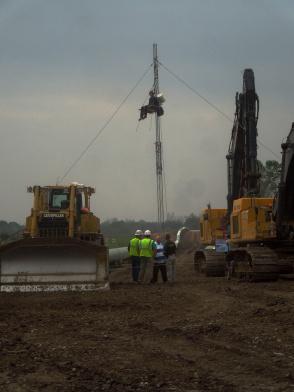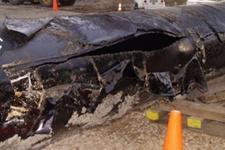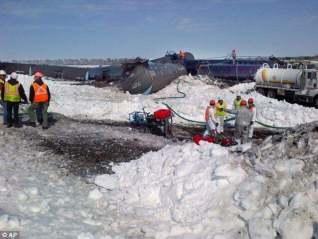Keystone XL Pipeline Compilation by Earth First! Journal Collective

Great Plains Tar Sands Resistance shoot an Oklahoma native up a monopole!
Today, Monday, April 22 is the deadline for the last official public comment period on the Obama administration’s review on the Keystone XL Pipeline. It also happens to be Earth Day – a day that is celebrated worldwide to demonstrate support for environmental protection. Wouldn’t today be a great day to stop TransCanada’s Keystone XL pipeline from further construction, destruction and future eruptions!!!
The clock is ticking on our last chance to officially weigh in on the “game over for the climate” Obama Tar Sands pipeline, before the president makes his decision later this year. There are many ways you can make your voice of opposition to this pipeline heard – break the silence and make a ruckus! There are also countless petitions circulating the internet that need as many signers as possible! Cross-post the news to your family and friends, have conversations with people in your office and ask them – are you familiar with the Keystone XL pipeline and the Alberta tar sands, because today is the day to read all about it and do something about it!
The State Department’s latest sham review of the Keystone pipeline – the Draft Supplemental Environmental Impact Statement that is the subject of this comment period – ignored the pipeline’s significant risk for toxic spills, ignored its catastrophic impacts on our climate,1 and ignored the clear consensus among financial analysts and oil executives who agree Keystone XL will make the difference in tar sands development.
We need a response that will make clear to the Obama administration that Americans oppose the Keystone XL pipeline.
Promise: Escalating Action on Keystone XL
On Earth Day and at the closing of the State Department’s public comment period on the Keystone XL tar sands pipeline, indigenous activists, landowners and grassroots leaders will host a press call to preview this summer’s ongoing and escalating resistance to TransCanada’s dirty pipelines.
CREDO - a phone company that uses its business to increase awareness on issues from fracking to GMO Salmon to the Keystone Pipeline – has a network of 60,000 activists. On their website, anyone can “take action” by signing petitions – but this is not the only kind of action Credo is encouraging their network to engage in. Credo is teaming up with the Rainforest Action Network, Tar Sands Blockade and two bands of the Sioux nation who are approving resolutions to block the pipeline from entering their treaty territories.
This new coalition of organizations and Indigenous activists comes in response to the potential Obama administration approval of the northern segment of Keystone XL. Today this coalition will be discussing the direct action needed to continue to put a wrench in the gears of the pipeline and the movement of Alberta tar sands through native lands, farm lands, homelands of communities of people who are not being given a fair vote on the matter. Though Earth Day maybe a cliche to those of us who have a lifelong commitment to protecting our planet from profiting polluters – it can also be a day to implement great action in solidarity with the Earth!
Here’s a look at one Texas landowner has to say about the Keystone XL pipeline:
Killing More Jobs Than it Creates

photo: NTSB The tar sands pipeline that spilled a million gallons of toxic heavy oil into Michigan’s Kalamazoo River last summer illustrates the dangers this type of uniquely corrosive oil will bring along the Keystone XL route.
According to the U.S. State Department the pipeline would create at most 6,500 temporary construction jobs, and would leave only “hundreds” of permanent jobs, according to TransCanada, the Canadian company that wants to build the pipeline. Claims that the pipeline would employ tens or even hundreds of thousands of people are simply not true. A Cornell University study concludes the pipeline would kill more jobs than it would create, by reducing investment in the clean energy economy.
Tar Sands Oil is the Dirtiest Oil on the Planet
Producing synthetic crude oil from tar sands generates three times the global warming pollution of conventional crude production. Extracting tar sands bitumen – a low-grade, high-sulfur crude oil that must be extensively refined to be turned into fuel – uses vast amounts of energy and water.
Canadian Tar Sands Oil Would be Exported
Keystone XL would have diverted Canadian oil from refineries in the Midwest to the Gulf Coast where it could be refined and exported. Many of these refineries are in Foreign Trade Zones where oil may be exported to international buyers without paying U.S. taxes.
The facts reveal this pipeline was never in America’s national interest. Clean energy and fuel efficiency is the path forward for economic and energy security in America – not another tar sands pipeline. By rejecting the Keystone XL pipeline, President Obama is helping move America down a cleaner, safer path.
Simple Math: Keystone XL Pipeline = Tar Sands Expansion = Climate Change
Cross-posted from Natural Resources Defense Council
John Kerry, the newly-elected Secretary of State, is one of the key decision-makers on the Keystone XL Pipeline – a man who’s speech to the Senate last summer slammed the U.S. political discussion as a “conspiracy of silence … a story of disgraceful denial, back-pedaling, and delay that has brought us perilously close to a climate change catastrophe.” He goes on to say:
“It is a conspiracy that has not just stalled, but demonized any constructive effort to put America in a position to lead the world on this issue…. Climate change is one of two or three of the most serious threats our country now faces, if not the most serious, and the silence that has enveloped a once robust debate is staggering for its irresponsibility….
I hope we confront the conspiracy of silence head-on and allow complacence to yield to common sense, and narrow interests to bend to the common good. Future generations are counting on us.”
Does that sound like a person who is going to start his term as Secretary approving the expansion of one of the dirtiest sources of fossil fuels in the world? New research confirms what we have heard time and again from the industry itself: more tar sands oil taken out of the ground means more dangerous pollution that hurts our climate and health. And, this new research also shows that tar sands will cause even more climate pollution than we previously thought due to the impacts of the high carbon byproduct petroleum coke.
This is especially important in a time where our communities are feeling the damage of climate change in violent storms, wildfires, droughts and floods. Earlier this year, a federal advisory panel—established by Congress in 1990 to analyze climate research—released the draft of its third National Climatic Assessment. The report confirmed there is “unambiguous evidence” that the earth is warming.
Oil Change International’s new report “Petroleum Coke: The Coal Hiding in the Tar Sands” reveals that current analyses of the impacts of tar sands fail to account for a high-carbon byproduct of the refining process: petroleum coke. Because it is considered a refinery byproduct, petcoke emissions are not included in most assessments of the climate impact of tar sands. Thus, the climate impact of oil production is being consistently undercounted.
This analysis is making headway in Washington. Energy and Commerce Committee Ranking Member Henry A. Waxman noted: “The new reports show that TransCanada’s Keystone XL pipeline is the key that will unlock the tar sands. If the pipeline is approved, the world will face millions more tons of carbon pollution each year for decades to come. After Hurricane Sandy, devastating drought, unprecedented wildfires, and the warmest year on record in the United States, we know that climate change is happening now, we have to fight it now, and we must say no to this pollution pipeline now.”
Unfortunately, most of know that the tar sands have been unlocking from the earth for a long time already, as the dangerous surface mining has been happening in Alberta, Canada. President Obama unlocked the tar sands for US import nearly 4 years ago. Old dirty pipelines are being used to move tar sands, and as we witnessed in the train spill, our locomotives and open air have been polluted with tar sands – and already our soil and water due to the spill that occurred On March 27, a massive train operated by Canadian Pacific Railway derailed, spilling 30,000 gallons of crude oil in western Minnesota. The train originated in western Canada and was bound for Chicago.
Exxon Mobil Pipeline Rupture and Train Derailment Oil Spill Exemplify Concerns of Keystone XL
Cross-posted from EcoWatch
Lately, it seems oil spills have become a part of our daily news.

Dan Olson, a spokesperson for the Minnesota Pollution Control Agency, confirmed to Tar Sands Blockade that the substance spilled is, indeed, tar sands from Alberta, Canada. “Only about 1,000 gallons has been recovered,” said Olson. “The remaining oil on the ground has thickened into a heavy tar-like consistency.” The spill has triggered an investigation by federal officials.
The AP reports that the spill could play a role in the politics surrounding the Keystone XL tar sands pipeline.
“For years, we’ve been saying that it’s just a matter of time before Keystone XL, if constructed, spills, bringing death and destruction to all in its route. The pipeline would also incentivize further tar sands growth and exploitation, signifying game over for livable communities and the planet,” said Tar Sands Blockade.
“In addition to hazardous spills, according to EPA, the global warming impact of building the Keystone pipeline is the equivalent to over four million cars or six coal-fired power plants. For the sake of the health and safety of our environment, we ask President Obama and the State Department to reject the Keystone XL pipeline and to oppose other tar sands projects, like the pipeline that would take tar sands oil through Sebago Lake in Maine,” said Gatti.
“Regardless of the transportation mode, an oil spill still contaminates Mother Earth and creates health and environmental concerns. This is why we want Enbridge’s illegal pipelines to cease the flow of oil and to be removed from the Red Lake Reservation. It is just a game of Russian Roulette as to where and when a spill occurs,” said Marty Cobenais, organizer for the Indigenous Environmental Network, a member of Red Lake Ojibwe and the Enbridge Blockade, in response to the catastrophe in Minnesota.

